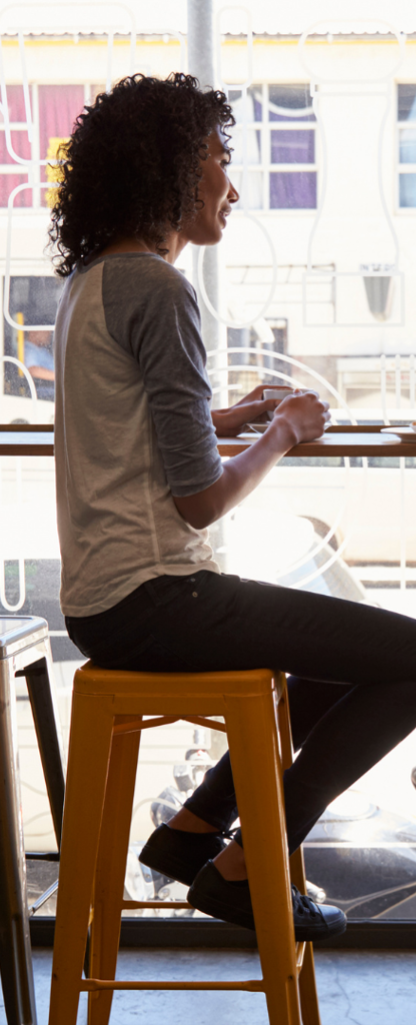We are praying for you.
PeaceHouston.com is a Love Your Neighbor Initiative of Bethel Church.
825 Bering Dr. Houston, TX 77057


Today, we're talking about how to get unstuck, why pain is good, and living from our true identity versus this current cultural obsession with radical individualism, finding yourself inside yourself, speaking 'your truth,' and the like. So buckle up and get ready.

We're always waiting for the breakthrough moment. The conference that will change everything. The prayer that finally brings clarity. The conversation that unlocks all the answers. Meanwhile, anxiety builds in the spaces between these hoped-for revelations, and we miss what's happening right in front of us.
A friend recently shared how she spent years chasing spiritual highs, thinking that if she could just have one more powerful experience, her anxiety would finally dissolve. She attended every retreat, read every trending book, listened to every recommended podcast. But peace remained elusive, always just one more experience away.
What shifted for her wasn't another mountaintop moment. It was a Tuesday morning when her coffee maker broke. Standing in her kitchen, frustrated and uncaffeinated, she noticed the way morning light filtered through her window, creating patterns on the counter she'd never seen before. For just a moment, she stopped. Really stopped. And in that pause, something settled.
This is the paradox we often miss: the very ordinariness we're trying to escape might be where peace has been waiting all along. Not in the extraordinary, but in the everyday. Not in the breakthrough, but in the breakfast dishes. Not in the revival, but in the routine.
There's a particular exhaustion that comes from constantly reaching for the next thing. We've been conditioned to believe that peace is a destination, something we achieve through enough effort, enough faith, enough spiritual discipline. But what if this constant reaching is actually feeding our anxiety rather than solving it?
Think about it. When we're always looking ahead to the next solution, we're essentially telling ourselves that this moment isn't enough. That we're not enough. That God's presence here, now, in this ordinary Tuesday afternoon, somehow isn't sufficient. No wonder we're anxious. We've turned peace into a performance metric.
The spiritual life isn't just lived in the highlights. It's in the waiting room at the doctor's office. It's in the third load of laundry. It's in the commute that feels endless. These aren't interruptions to our spiritual journey; they are the journey.
A mother of three recently told us how she used to feel guilty that she couldn't maintain a consistent morning devotional routine. Between packed lunches and permission slips, her mornings were chaos. But she started noticing something: while braiding her daughter's hair, while tying her son's shoes, while pouring cereal into bowls, she was actually practicing presence. These weren't just tasks to complete; they were moments of connection, small acts of love that looked nothing like her idealized vision of spiritual practice but were perhaps more honest than any perfectly structured quiet time.
One of the most isolating aspects of anxiety is feeling like everyone else has access to some secret spiritual formula we're missing. Social media doesn't help, with its steady stream of sunset prayers and journal entries that look like calligraphy art. But when we actually sit down with each other, over real coffee in real life, something different emerges.
We discover that everyone is navigating the ordinary. Everyone has days where faith feels more like showing up than soaring. Everyone knows what it's like to search for God in the spectacular while He's been sitting quietly in the simple all along. This shared ordinariness, when we're brave enough to admit it, becomes its own form of communion.
What would change if we gave ourselves permission to find peace in the unremarkable? If we stopped treating ordinary moments as obstacles to overcome and started seeing them as invitations to be present?
This doesn't mean manufacturing meaning where there isn't any or pretending that washing dishes is a mystical experience. It simply means acknowledging that peace might be less about achieving a certain state and more about noticing what's already here. The breath that keeps coming without our management. The heart that keeps beating without our permission. The grace that keeps showing up in Tuesday mornings and Thursday afternoons and all the in-between moments we usually rush past.
Maybe you're reading this between meetings, or while dinner simmers on the stove, or in those few minutes before the kids wake up. Maybe you're in one of those ordinary moments right now, wondering if there's something more you should be doing to find peace.
What if there isn't? What if the invitation isn't to do more but to notice more? To recognize that the sacred doesn't always announce itself with fanfare. Sometimes it shows up in the steady rhythm of ordinary life, in the small mercies we almost miss, in the quiet revolution of simply being present to what is.
We'd love to hear about your ordinary moments. The ones where peace surprised you. The ones where God showed up without announcement. Sometimes the best conversations happen not when we share our victories, but when we share our Tuesday mornings. If you'd like to talk about the beautiful mundane of your own journey, we're here. Sometimes peace begins with a simple conversation over coffee, where two people admit that they're both just figuring it out as they go, finding the sacred hidden in plain sight.
There's a particular kind of pressure that builds when we think we need to pray "correctly." Maybe you've felt it too: that tightness in your chest when someone asks you to pray aloud, or the frustration when your mind wanders mid-conversation with God. We've somehow absorbed the idea that prayers need to be eloquent, complete, and tied up with a neat "amen" at the end. But what if our most powerful prayers are the ones we can't quite finish?
Think about the last time you tried to explain something deeply important to someone you love. Did the words come out perfectly? Or did you find yourself starting and stopping, circling back, trying different angles to capture what your heart was holding? That's often what real communication looks like, especially when the stakes are high and the emotions are raw.
A friend recently shared how her prayer life changed when she stopped trying to construct perfect sentences for God. She'd been dealing with chronic anxiety about her teenage son's struggles, and every night she'd attempt these elaborate prayers, listing every concern, trying to cover all the bases. The prayers felt more like presentations than conversations, and they left her more exhausted than peaceful.
One particularly difficult evening, she simply sat in silence and whispered, "I don't know how to pray about this anymore." Then she stopped. No conclusion, no request, no theological framework. Just that honest admission hanging in the air. And in that unfinished moment, she felt something shift. The pressure to perform dissolved, replaced by a sense of being held.
This isn't about being lazy with our spiritual practices. It's about recognizing that sometimes our anxiety increases when we try to package our messy reality into tidy spiritual boxes. The ancient mystics understood this. They spoke of "sighs too deep for words" and the value of simply being present with the Divine, even when language fails us.
We live in a culture obsessed with closure. Every story needs an ending, every problem needs a solution, every question needs an answer. But life rarely works that way, does it? We're all walking around with unfinished business, carrying questions that don't have clean answers, nursing wounds that haven't fully healed. And maybe that's okay. Maybe that's more than okay. Maybe that's human.
When we bring our incomplete prayers to God, we're actually being more honest than when we pretend to have everything figured out. There's something profoundly peaceful about admitting, "This is all I've got right now." It's like setting down a heavy backpack you didn't realize you were carrying.
Consider how children communicate when they're upset. They don't craft elaborate explanations. They might just say "It hurts" or "I'm scared" or sometimes they just cry. And good parents don't demand more words; they simply respond to the need behind the incomplete expression. What if we could trust that divine love works the same way?
Here's what's beautiful: when we start being honest about our unfinished prayers, we create space for others to do the same. Suddenly, that coffee conversation doesn't have to be about having answers. It can be about sharing the questions. That small group doesn't need to be filled with people who have their faith figured out. It can be a gathering of people who are all figuring it out together, one incomplete prayer at a time.
There's a particular kind of peace that comes from realizing you're not the only one whose prayers trail off into silence sometimes. You're not the only one who starts strong and then gets lost in the middle. You're not the only one who sometimes just sits there, hoping that presence is enough when words aren't.
This kind of honesty in community is transformative. When someone across the table admits they've been praying the same three-word prayer for months because that's all they can manage, it gives everyone else permission to be real about their own spiritual struggles. The anxiety of performance melts away, replaced by the relief of authentic connection.
If you're reading this and feeling the weight of all your unfinished prayers, all the conversations with God that you never quite completed, here's an invitation: What if you started exactly where you are? Not where you think you should be, not where others appear to be, but right here in the middle of your incomplete thoughts and half-formed hopes.
Maybe your prayer today is just "Help." Maybe it's "I'm trying." Maybe it's silence punctuated by a sigh. Maybe it's showing up to that coffee meeting and admitting you don't know how to pray about what you're facing. These unfinished prayers aren't failures; they're honest beginnings.
The peace we're all searching for might not come from having perfect words or complete thoughts. It might come from the courage to be incomplete, to be in process, to be human in the presence of divine love that doesn't require our performance. In a world that demands we have it all together, choosing to bring our unfinished prayers to God and to community might be the most faithful thing we can do.
After all, every meaningful conversation is really just a series of unfinished prayers, each one leading to the next, creating a dialogue that spans a lifetime. And maybe that's exactly how it's supposed to be.
There's a peculiar kind of anxiety that comes from feeling like we're not ready yet. Not ready to join that small group because our faith feels shaky. Not ready to reach out for help because we haven't figured out how to articulate what's wrong. Not ready to show up at church because we're still wrestling with doubts. We tell ourselves we'll engage with community once we've sorted ourselves out, once we've become the version of ourselves that won't be a burden or disappointment.
But here's what nobody talks about: everyone else is also in process. That person who seems to have unshakeable faith? They're questioning things too. The couple with the perfect marriage? They're learning as they go. The parent who appears so confident? They second-guess themselves daily.
Think about how a house gets renovated. For months, it's a disaster zone. Walls torn down, dust everywhere, exposed wiring, tools scattered across every surface. If you only visited during the demolition phase, you'd think the place was falling apart, not being transformed. But transformation is messy work. It requires tearing down before building up, clearing out before filling in.
Our lives are similar construction zones. We're constantly being renovated, rebuilt, restored. And just like that house mid-renovation, we often feel embarrassed about letting people see us in this state. We put up barriers, create distance, wait until the paint dries and the furniture is arranged before we open our doors.
But what if the construction phase is exactly when we need people most? What if community isn't about presenting our finished selves but about sharing the renovation process together?
There's something profoundly liberating about admitting we don't have it all figured out. When we stop pretending to be complete, we create space for genuine connection. It's like finally exhaling after holding your breath for too long.
Consider how children approach life. They don't wait until they've mastered walking before they attempt it. They fall, they wobble, they grab onto furniture and helpful hands. They're completely unashamed of their learning process. Somewhere along the way, we adults decided that needing help or being in process was something to hide.
But growth happens in community. We learn by watching others navigate similar struggles. We find courage in shared vulnerability. We discover that our specific brand of messiness isn't as unique or shameful as we thought.
Faith communities at their best aren't museums displaying finished masterpieces. They're more like art studios where everyone is working on their canvas, sharing brushes, offering perspectives, sitting with each other through creative blocks. The beauty isn't in the perfection of any individual piece but in the shared process of creation.
When we show up incomplete, we give others permission to do the same. Our honesty about where we're struggling becomes an invitation for someone else to stop pretending. Our questions make room for others to voice their own uncertainties. Our admission of need creates space for community to actually be community.
What would it look like to embrace being seen in process? Maybe it starts small. Instead of waiting until you have profound insights to share in a conversation, you simply admit you're still thinking things through. Instead of postponing that coffee date until you feel more put together, you show up with your current mixture of hope and uncertainty.
There's a particular kind of courage required to let people see your rough drafts, your first attempts, your works in progress. It feels vulnerable because it is vulnerable. But vulnerability isn't weakness; it's the birthplace of connection.
Anxiety often stems from the gap between where we are and where we think we should be. We measure ourselves against imaginary finish lines, completed versions of ourselves that always seem just out of reach. But what if peace isn't found in reaching the destination but in accepting the journey?
What if the community around us isn't waiting for us to arrive but hoping we'll join them in the traveling? What if the invitation isn't to be complete but to be companioned in our incompleteness?
The truth is, we're all works in progress, all rough drafts being revised, all houses under renovation. Some days we're making visible progress, other days it feels like we're moving backward. But in community, in the presence of others who are also figuring things out, we find that being in process isn't something to overcome but something to share.
Perhaps the most courageous thing we can do is show up before we're ready, speak before we have all the words, connect before we feel worthy of connection. Because in that space of shared incompleteness, something beautiful happens. We discover we're not alone in the mess. We find that grace has room for our unfinished parts. We learn that peace isn't the absence of process but the presence of people willing to be in process with us.
So maybe today, instead of waiting to be ready, we simply show up as we are. Incomplete, uncertain, but courageously present. Ready or not, we're better together in the beautiful mess of becoming.
We've become solution addicts. The moment discomfort arises, we reach for our phones, searching for the five-step plan, the life hack, the expert opinion that will make everything okay. Anxiety about health? WebMD. Relationship troubles? Relationship coaches on Instagram. Spiritual questions? There's a podcast for that. But what happens when the questions we're carrying don't have tidy answers? What do we do when life refuses to fit into a downloadable PDF guide?
There's a particular kind of anxiety that comes from not knowing. It sits heavy in the chest, makes the mind race at 3 AM, and whispers that if we just tried harder, researched more, or found the right expert, we'd finally have peace. But here's what nobody talks about: sometimes the most healing thing we can do is stop trying to solve ourselves.
Somewhere along the way, we've internalized the message that we should be able to fix everything ourselves. Self-help culture, while often well-intentioned, has created a generation of people who feel like failures when they can't think their way out of pain or strategize their way out of suffering. We've become our own exhausting project managers, constantly evaluating our progress, adjusting our strategies, and beating ourselves up when the metrics don't improve.
Consider Sarah, a marketing manager who recently shared her story over coffee. After her father's sudden diagnosis, she threw herself into research mode. Medical journals, alternative treatments, support group forums. She created spreadsheets, tracked symptoms, coordinated second opinions. All good things, certainly. But underneath all that productive energy was a terror she couldn't name: the fear that if she stopped moving, stopped solving, she'd have to feel the full weight of potentially losing her dad. The anxiety wasn't just about the situation; it was about her inability to control it.
There's something profoundly countercultural about admitting we don't have answers. In professional settings, we're taught to project confidence even when we're unsure. On social media, vulnerability is acceptable only when paired with a redemptive ending, a lesson learned, a victory claimed. But real life is messier than that. Real faith is messier than that.
What if peace doesn't come from having answers but from being held in our questions? What if the path through anxiety isn't around uncertainty but directly through it, accompanied by others who are brave enough to say, "I don't know either, but I'll sit here with you"?
This isn't about giving up or becoming passive. It's about recognizing that some of life's deepest questions aren't problems to be solved but mysteries to be lived. The couple struggling with infertility doesn't need another article about statistics. The recent graduate facing an uncertain job market doesn't need another motivational quote. The parent watching their child struggle doesn't need another parenting strategy. Sometimes, what we need most is permission to not have it figured out.
One of the most beautiful things about authentic community is that it creates space for not knowing. When we gather with others who are willing to be real, we discover we're not the only ones carrying questions without answers. There's a strange comfort in this shared uncertainty, a relief in discovering that confusion isn't a sign of weak faith but often evidence of an honest one.
Think about the last time someone sat with you without trying to fix you. Remember how it felt when someone listened without immediately offering advice, when someone validated your struggle without minimizing it with quick solutions. That's the gift we can offer each other: presence without pressure, companionship without conditions.
Learning to hold questions without demanding immediate answers is a practice, and like any practice, it takes time. Start small. When anxiety rises about an uncertain situation, try pausing before reaching for your phone. Sit with the discomfort for just a moment. Notice it without judging it. You might find that the feeling, while uncomfortable, won't actually destroy you.
Try sharing an uncertainty with someone without asking for their advice. Simply say, "I'm struggling with this, and I don't know what to do." Notice how different this feels from the usual dance of problem-presentation and solution-seeking. You might be surprised by the depth of connection that emerges when two people can be uncertain together.
If you're reading this while carrying questions that feel too heavy to bear alone, know that you don't have to have answers to be welcomed into community. You don't need to have your theology figured out to belong. You don't need to have conquered your anxiety to be worthy of connection. Sometimes the bravest thing we can do is show up with our questions, our doubts, our uncertainties intact.
There's a different kind of peace available to us, one that doesn't depend on having life figured out. It's the peace of being known in our not-knowing, of being loved in our uncertainty, of being held even when we can't see the way forward. This peace doesn't always calm the storm, but it does remind us we're not facing it alone.
Maybe that coffee conversation you've been putting off isn't about finding someone with answers. Maybe it's about finding someone willing to sit in the questions with you. Because sometimes, the most sacred thing we can offer each other isn't certainty but presence, not solutions but solidarity, not answers but the courage to keep living the questions together.
We have been created for, and called into community, by God, who is Himself community. Father, Son, and Holy Spirit. Henri Nouwen once wrote, “God has made us into his people by calling us out of ‘Egypt’ to the ‘New Land,’ out of the desert to fertile ground, out of slavery to freedom, out of our sin to salvation, out of captivity to liberation. All these words and images give expression to the fact that the initiative belongs to God and that he is the source of our new life together.” And it’s with gratitude to God that we can give ourselves to others in community.
Isolation is living without light. No light, no life. The things that lead to death grow in the dark. For example, anxiety and depression grow in the dark. And in the dark, what grows doesn’t get better, it just gets bigger. Richard Baxter said, “In this dark, disordered condition, you're unfit to judge your own condition or the way to approach your duty.” Lies also get louder in isolation. Lies like we’re all alone. And because the Lord often uses others to communicate His love, when we live in isolation we lose our ability to believe that we are loved. That is right where the enemy of our souls wants us. But Jesus said, “the truth will set you free” (John 8:32). A relationship with God and others is not out of reach. Truth can be found in Christian community. That is good news! That is the Gospel!
Community is where others care for us, and where we care for others. In Christian community this is lived out with great purpose under the power of the Holy Spirit. It is the only way to live in obedience to God. “Carry each other's burdens and in this way you will fulfill the law of Christ (Galatians 6:2). That’s why God baked the need to need, and the need to be needed into our DNA. When we start thinking that weakness is wrong, we are the ones who are actually wrong. In fact, Jesus said “My grace is sufficient for you, for my power is made perfect in weakness” (2 Corinthians 12:9). Together we can reject the rugged individualism that leads to reckless isolationism. And although we have been invited out of isolation, we must be intentional. Christian community must be calendared. So, I may not know you, but I know God, and with His help I know you can be responsible enough to reach out for relationship.

PeaceHouston.com is a Love Your Neighbor Initiative of Bethel Church.
825 Bering Dr. Houston, TX 77057